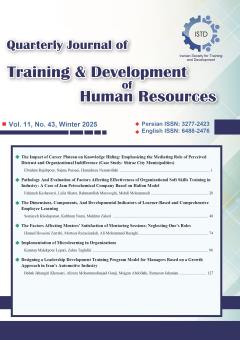The Factors Affecting Mentees’ Satisfaction of Mentoring Sessions; Neglecting One’s Roles
Subject Areas :
hamed hosseini zarrabi
1
![]() ,
Morteza Rezaeizadeh
2
,
Morteza Rezaeizadeh
2
![]() ,
َalimohamad razeghi
3
,
َalimohamad razeghi
3
![]()
1 - Assistant Professor, Department of Entrepreneurship Development, Faculty of Entrepreneurship, University of Tehran, Tehran, Iran
2 - Assistant Professor, Department of Educational Sciences, Faculty of Educational Sciences and Psychology, Shahid Beheshti University, Tehran, Iran.
3 - PhD student in Organizational Behavior, Faculty of Management, Kharazmi University, Tehran, Iran.
Keywords: mentoring, effectiveness evaluation, mentor, accountability,
Abstract :
Examination of mentoring effectiveness in organizations as a semi-formal, personalized, and costly has been constantly mention as a challenge. This study seeks to identify the criteria and factors affecting the success of organizational mentoring sessions. To this aim, the managers who had experience attending mentoring sessions as mentees were interviewed. These managers were selected through purposeful snowball sampling as the research sample and the research instrument included a semi-structured and phenomenological interview. In addition, researchers’ self-review and intercoder agreement were applied to confirm the acceptability and validity of the research. After conducting the interviews, coding was carried out using thematic analysis. According to the findings of this research, eight criteria including mentor's professional experience, the mentor's subject matter and expertise, effective questioning, the mentor's empathy, attention to the mentee's characteristics, transparency in the relationship between the mentor and mentee, the mentor's reliability, and the applicability of the mentor's solutions were identified and discussed as factors affecting the success of organizational mentoring. These criteria could ne applied for evaluating and enhancing the effectiveness of organizational mentoring sessions. However, the significant point was that all of these factors were related to the mentors, and the mentees did not consider any factors related to themselves for the effectiveness of the mentoring process.
